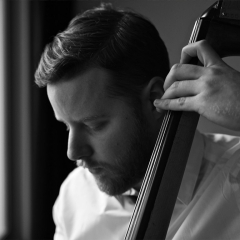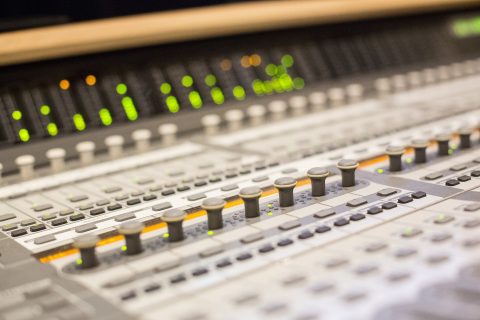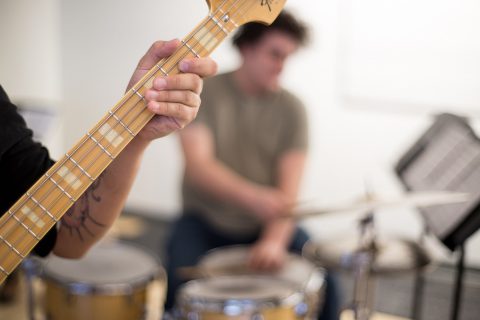Music (BFA)
Why study Music?
There has never been a culture without music — it nourishes our hearts and minds and stirs our souls. If your goal is to immerse yourself in the making of music, Concordia’s Major in Music program offers you the flexibility to control your own future — whether you want to compose, write songs, perform, produce, manage artists, or become a music therapist.
Taking classes and working in our studios and rehearsal spaces will give you the skills, knowledge, discipline and experience you will need. After your first year you may transfer into the Specialization in Music Performance or Composition programs, or continue in the Major for the most flexibility. You will have the opportunity to:
- Perform in the University or Chamber Choir, Contemporary Music Ensembles, or Transdisciplinary Creation and Performance projects
- Give a public presentation of your own creative “capstone” project in your final year
Instrumental audition optional, can be a creative portfolio of tracks, songs, or compositions. Instrumental audition for Private study courses
Specialized pathways: Updated curriculum paths lead to upper-level Songwriting or Composition for Image and Media courses
After graduation you’ll have the knowledge, skill and passion to succeed as a musician or pursue graduate studies.
Program highlights
- Access to fully equipped practice rooms and recording studios, as well as over two dozen well-maintained pianos and seven concert grands
- Opportunities to perform in Concordia’s great concert spaces and in local venues
Special funding for out-of-province students
Up to $4000 for undergraduate programs.
Program structure
A Bachelor of Fine Arts degree takes a minimum of three or four years (90 – 120 credits) of full-time study, depending on your academic background.
Program options
- Specialization in Music Composition (66 credits)
- Specialization in Music Performance (66 credits)
- Major in Music (54 credits)
- Minor in Music (24 credits)
Please note: the Minor in Music is not open to new applicants and is only available in the classical/contemporary genre.
Courses
United States students: A U.S. Federal Student Aid-eligible version of this program is offered. This version meets all U.S. regulations (such as no co-operative education or e-courses) for eligible programs.
Admission criteria
This program is available for Fall admission only.
Minimum cut-off averages and course requirements
- Quebec CEGEP: DEC
- High School: C+
- ACT or SAT is NOT required
- Canadian curricula course requirements
- Accepted international qualifications
- International Baccalaureate (IB) diploma: 26
- International Baccalaureate Career-related Programme (CP): 4.3/7
- Baccalauréat français: 11
- British system of education (GCE):
- A-levels: At least two A-level exams CD or
- AS-levels: At least 4 AS-level exams with equivalent results or
- BTEC: Level 3 Diploma or Extended Diploma in a related subject area with equivalent results
- Additional information for British System of Education (GCE) applicants
- University Transfers (internal/external): C
Additional requirements for admission
Applicants must submit additional requirements for admission directly to the department.
Music admissions package submission deadline: March 1
Applicants must apply online before submitting the music admissions package.
We need to know more about you than the general University application provides.
- Information about you and your musical background
- Online basic theory screening test
- Video audition and/or Creative portfolio
- Online theory and ear-training placement tests
Applicants to the Major in Music may choose to submit either an instrumental audition or a creative portfolio—both are valued equally in the admissions process. Students can also submit both, but at least one is required. While submitting an instrumental audition is optional, it is required for those who wish to register for individual performance lessons (Private Study) in their chosen instrument.
Accepted students may also audition later in their studies if desired. It is the applicant’s responsibility to upload the video audition and/or Creative portfolio online by the prescribed deadline. Test results are sent after the audition has been evaluated.
Please remember:
- To check the program availability for the fall, as late applications will continue to be accepted for certain programs for an undetermined amount of time
- Applicants must apply online before completing the online theory test and submitting their audition video
For more information on these additional requirements, please read the following:
Minimum cut-off averages should be used as indicators. The cut-off data may change depending on the applicant pool. Applicants who meet the stated minimum requirements are not guaranteed admission to these programs.
Admission to the Minor in Music is only open to students who are already in a degree program at Concordia University. It is not open to new applicants. For information on how to add the Minor in Music, look for the Internal transfer of program request.
Application deadlines

FALL ENTRY (September)
Deadline: March 1
International applicants: Apply no later than February 1 to allow time for immigration document processing. However, applying earlier is strongly recommended. Immigration processing times vary by country, and delays could prevent you from starting your studies on time.

WINTER ENTRY (January)
Admission to this program is available for the Fall Term only.
We reserve the right to close admission to a program at any time after the official deadline without prior notice.
After your degree
Your hard work while at Concordia will give you the knowledge and discipline to further your solo work, plus the teamwork skills to collaborate with others. Our alumni compose, perform, tour, produce original CDs, write for theatre, dance, film, TV and video games; their cultural work has been recognized through awards and prizes. Your degree can lead to many paths such as:
- Composer, arranger
- Performer
- Music therapist
- Administrator in the arts (band manager, festival organizer)
- Teacher, musicologist, researcher
Student story

Tim Charman
Major in Music
Playing music across genres and across borders prepared Tim Charman for the life he dreams of as a musician.
Other programs of interest

As an electroacoustic artist, your ear is your instrument. As a student, you will explore the possibilities for sonic creativity through electroacoustic composition, sound design and recording, while training your inner and outer ears.
Department
Faculty

Students in the Concordia Jazz Studies program, the first university-level jazz program in Canada, have a unique opportunity to become fully immersed in the sounds and traditions of a 100 year-old art form that’s truly modern and still evolving.
Department
Faculty


